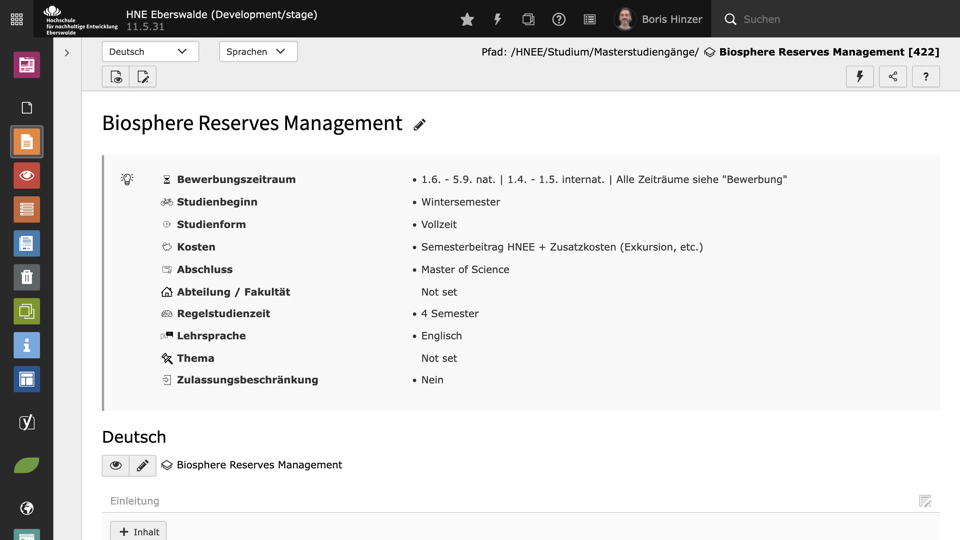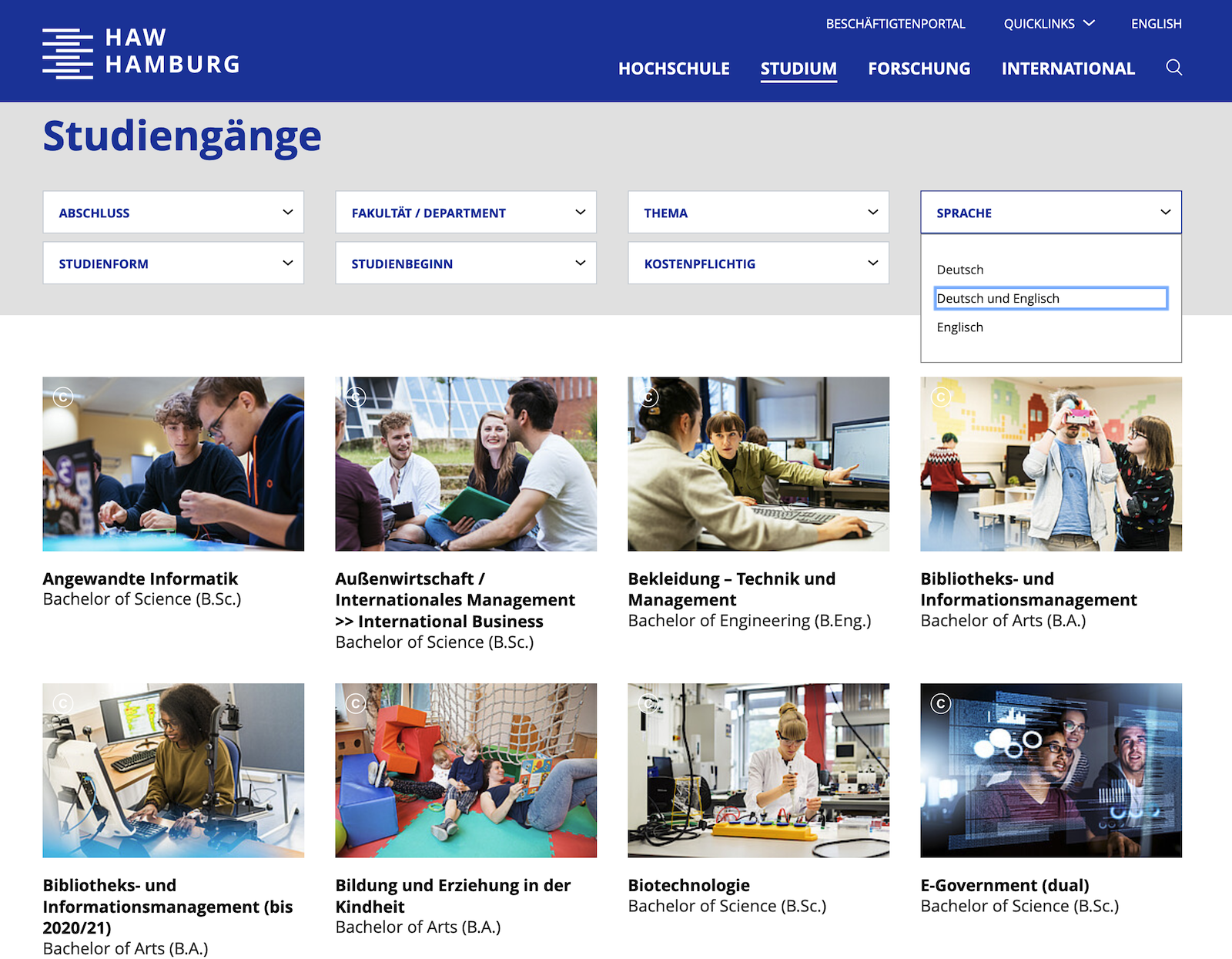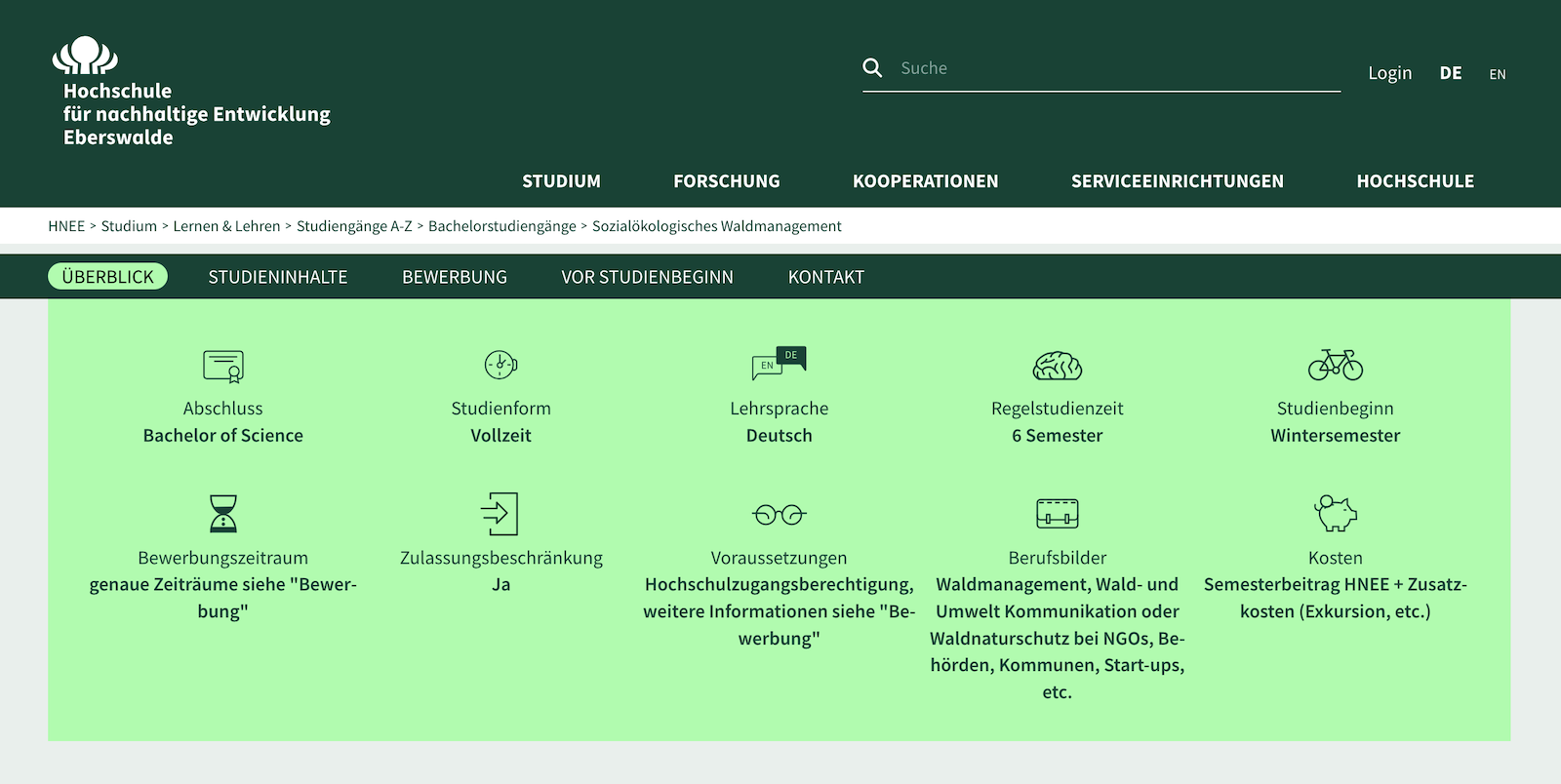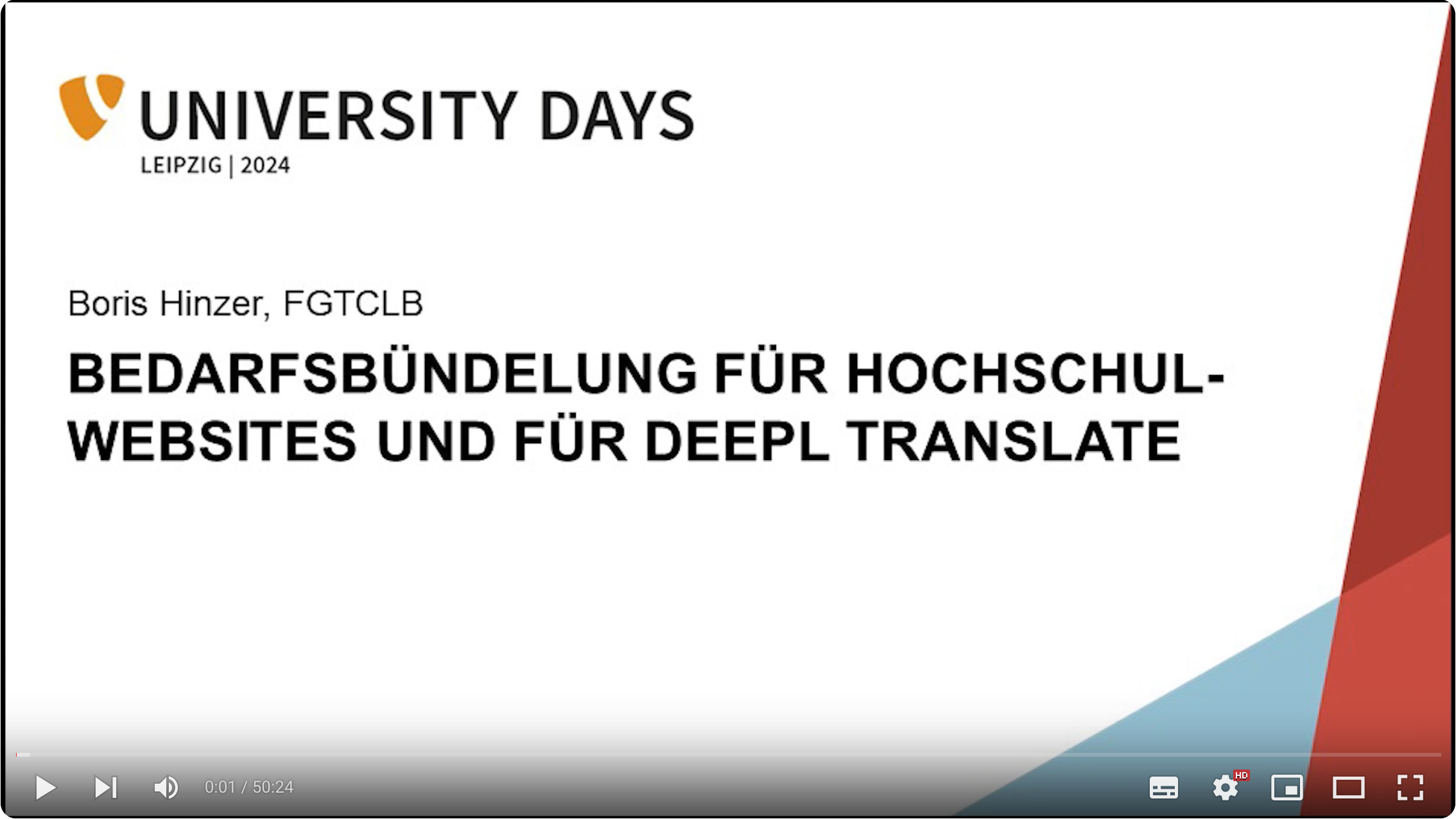TYPO3 for universities - Part 2
Demand pooling and study program information
In the increasingly digital world of higher education, it is crucial that information is presented efficiently and attractively - especially when it comes to the presentation of study programs. TYPO3, as one of the leading content management systems, offers universities a powerful solution for preparing study information for specific target groups and making it easily accessible.
In the first part of our series "TYPO3 for universities", we presented the basic advantages and possible applications of TYPO3 for the university sector. The focus was on the general requirements and the flexibility that TYPO3 offers for designing complex websites for students, teachers and administrative staff.
This second part is now specifically about the integration and structuring of study program information. We show how TYPO3 makes it possible to present study programs clearly and adapt them dynamically in order to offer prospective students optimal orientation and valuable information about the courses on offer.
It all started with the idea of pooling demand
In the higher education sector, universities, universities of applied sciences and research institutions are increasingly relying on open source software to support central tasks in administration, teaching and research. The applications range from learning management systems and research databases to administration systems for student and employee data. Open source is becoming increasingly important in the area of university presentation in particular, as many universities are designing their websites using free software such as TYPO3 as a content management system.
Although universities are often active in various committees, associations and interest groups and work on joint projects and research topics across universities, it is surprising that hardly any alliances have been formed in the area of website development. The often almost identical requirements could be developed jointly and made available as open source solutions.
By pooling requirements, universities can:
- Developjoint functions that are tailored to the specific requirements of universities and educational institutions, e.g. modules for examination management, research data management or automatic translation with DeepL.
- Improvesecurity and data protection standards that comply with legal requirements in the education sector (such as the GDPR in Europe) and protect the privacy of students and staff.
- Save costs for license fees, which are often high for proprietary software solutions, which is particularly important in the education sector, where budgets are usually limited.
Thus, demand pooling in open source development is an efficient means of pooling the needs and resources of different universities and jointly developing solutions that are scalable, cost-efficient and usable for all educational institutions.
Start of demand pooling at universities: DeepL Translate Glossary & Labels
The presentation of international content on university websites has become increasingly important in recent years. An illustrative example of this is the development and provision of an automatic translation function using DeepL Translate for TYPO3, which has been developed and published as open source by the TYPO3 agency web-vision since March 2020. This function fulfills the essential need of universities that rely on a multilingual website to address international students and researchers.
So while AI-supported translation was already possible in 2020 with DeepL and DeepL Translate for TYPO3, it soon became apparent that universities in particular had further needs for translation functions for TYPO3.
In addition to automatic translation, there was a growing need to manage specific technical terms in a centrally maintained glossary. Such a glossary ensures that key terms are always presented in a consistent and technically correct manner, without the translation quality suffering due to imprecise or contradictory formulations. The Carl von Ossietzky University of Oldenburg, the University of Music Würzburg and the University of Osnabrück have formulated joint requirements for this and are pooling their needs in order to drive them forward together as part of further development by web-vision.
A further step in the pooling of requirements was the development of a function that identifies AI-translated content with a label such as "Automatically translated". This provides users with transparency about the origin of the texts, creates trust and offers the opportunity to point out possible errors in the automatic translation. This approach was supported by other partners such as the Friedrich Ebert Foundation, the Eberswalde University for Sustainable Development (HNEE) and Aachen University of Applied Sciences.
DeepL Translate - Feature Sponsors
The following educational institutions have had web-vision jointly develop new functions for the DeepL Translate extension as part of a requirements pooling process. The requirements were determined jointly and the development was jointly financed. Thanks to this cooperative form of development participation, the glossary function, the markup labels for automatic translations and the simplified release with Enable-Translated-Content were successfully realized.
The first TYPO3 extension for study program information: Academic Studies
The "Academic Studies" extension is the first solution developed specifically for universities for the structured presentation of study program information. This extension arose from the urgent need to offer standardized and flexible options for presenting course content. The project was initiated as part of the website relaunch for the Eberswalde University for Sustainable Development (HNEE) by the FGTCLB agency network, which started the development process in February 2023. As the first alpha version of the website was to be presented at the university information day just four months later, rapid implementation was essential.
In intensive discussions and analyses with a total of five universities - including Leuphana University Lüneburg, Stuttgart University of Applied Sciences, Hamburg University of Applied Sciences and HNEE - it became clear that the previous management of study information was often individual and dataset-based. There was no standardized TYPO3 extension for this need, and each university pursued its own approach (not-invented-here syndrome). The aim of the Academic Studies extension was therefore to develop a standardized, flexible TYPO3 solution that was as close to the core as possible, enabling the central recording of global information such as application deadlines and study costs, while at the same time providing different content for prospective and current students.
How Academic Studies for TYPO3 works
The extension is based on a separate page type in TYPO3, which is specially designed for study information. The basic idea is to maintain structured information using system categories in the page properties.
This includes central categories such as type of degree, type of study, teaching language, standard period of study, start of study, application period and admission restrictions. Free information such as admission requirements, job profiles and costs supplement this structured data.
The use of typifiable system categories simplifies queries and further development - an approach that is already being used in other projects such as the Diocese of Limburg.
Advantages for TYPO3 editors at the university
The Academic Studies extension for TYPO3 offers editors a number of decisive advantages:
- No additional training required: since TYPO3 pages are already familiar to editors, this enables intuitive handling, creation and management of study program information.
- Development close to the core: The extension is closely based on TYPO3 and integrates seamlessly into the existing system. Upgrades for new TYPO3 versions are therefore possible without major rework.
- Structured information visible in the page module: The most important study information is maintained directly in the page properties and is visible in the page module above the content.
- Central management of global information: Important data, such as application deadlines, can be managed and updated centrally. All linked study program information is thus updated centrally.
- Working in the TYPO3 page tree: Degree courses can be created and organized in the page tree according to degree type (Bachelor, Master) or study form (full-time, dual).
Advantages for visitors to the university website
The Academic Studies extension also offers numerous advantages for users of the university website:
- Individual landing pages: Information can be presented individually by degree and type of study.
- Positive filter experience: Visitors only see relevant degree programs and information that match their interests. Filtering according to structured information ensures that users only receive positive results. Nonsensical filter combinations are therefore no longer possible.
- Relevant content: Different information is offered in a targeted manner for prospective and current students.
- Optimized SEO relevance: The pages are better indexed by search engines thanks to the structured presentation and target group-specific content.
- Essential information at a glance: Structured datacan be displayed attractively on the website using icons. Users can thus see the core information for their studies at a glance.
All in all, the "Academic Studies" extension offers universities a powerful tool for organizing and presenting their courses, which makes optimum use of the flexibility and functionality of TYPO3 and meets the growing demands of the university sector.
About the Academic Studies Extensions for TYPO3
The TYPO3 extension "Academic Studies" is a joint project of the FGTCLB agency network and is available as free open source software for TYPO3 version 11 LTS as of 10/2024. As part of the further development of the extension, versions for TYPO3 v13 and v12 LTS will be released in the future.
If you are interested in participating in the bundling of requirements for study information for TYPO3, would like to receive a demonstration, or would like to support the development, please contact us.
Video: Demand bundling for university websites & DeepL Translate
TYPO3 University Days 2024
On the occasion of the TYPO3 University Days 2024, Boris Hinzer, Managing Director of web-vision GmbH, gave a presentation on the topic of "Demand bundling for university websites & DeepL Translate".The video, which is available on YouTube, explains the basic idea of demand bundling, presents the resulting TYPO3 Academic Extensions and shows how the further development of the DeepL Translate extension for TYPO3 has progressed.
Links:
- TYPO3 Extension: Academic Studies for TYPO3 v11 in the TYPO3 Extension Repository (TER)
- TYPO3 Extension: Academic Studies for TYPO3 v11 on GitHub
- TYPO3 Extension: Basic Typed Categories for TYPO3 v11 in the TYPO3 Extension Repostitory (TER)
- TYPO3 Extension: Basic Typed Categories for TYPO3 v11 on GitHub
Note:
This is part 2 of the article series "TYPO3 for Universities" on the topics"Demand pooling and course information for universities".
Part 1 of the article series "TYPO3 for universities" with the topics "Dissemination of TYPO3 and Academic Committee" can be found here.






